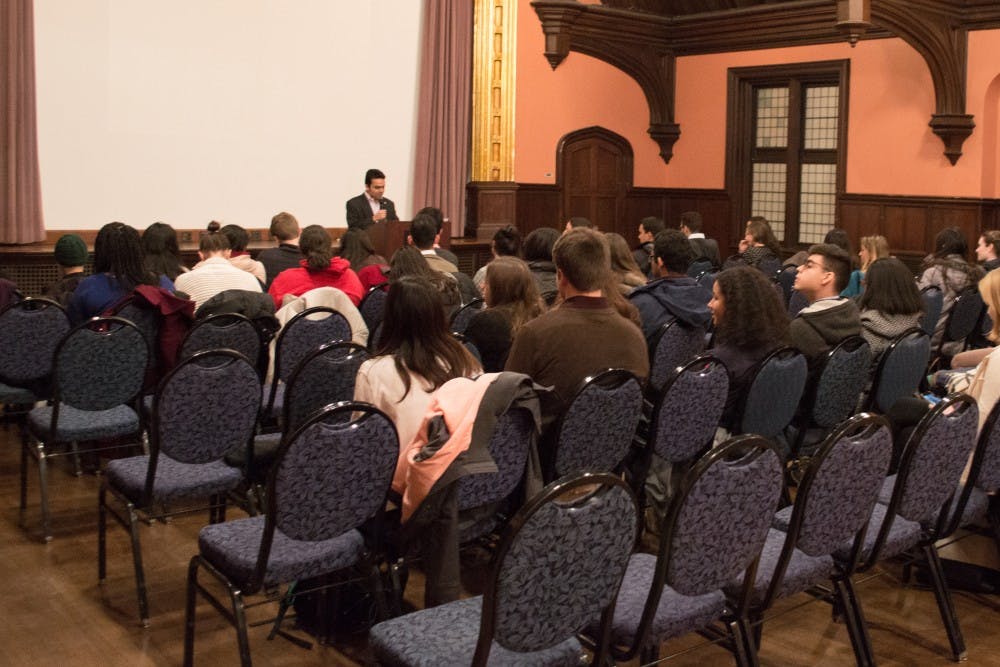
To open the conference, delegates from each Ivy League school gave presentations on the state of mental health on their campuses.
Credit: Avalon MorellOver the weekend, students from across the Ivy League gathered on Penn’s campus to participate in panel discussions and workshops as part of the Unmasking the Ivy League Conference. Organized by a dozen Penn students, the first-ever Ivy League mental health summit was designed to gather some of the brightest minds to discuss the state of mental health on college campuses and empower students to invoke change at their universities.
According to the conference’s website, the three days of programming sought to address the “theme of unearthing campus perceptions of success.” True to its goal, this came up again and again in the hour-long workshops held on Saturday at Huntsman Hall.
In a panel discussion facilitated by Penn’s Counseling and Psychological Services on Expectations of the Ivy League, students across all eight schools expressed a struggle to define their identity by means other than stellar GPAs and coveted internships. Collectively they wondered, can someone be successful if they aren’t the best at everything they try?
At first glance, the answer seems to be an obvious “yes.” The trouble is getting students in intense academic, pre-professional climates like Penn to realize that. Perhaps one of the most difficult things for students to overcome in the Ivy League is being mediocre for the first times in their lives.
If, all of your life, everyone around you tells you that you are the best, and, as a result, you build your confidence from external validation, imagine how crushing it must feel when you get a B- for the first time in your life at the age of 18 or 19. With living away from home for the first time and having to reestablish support networks in the absence of parents or trusted friends, it’s enough to wreck a person’s psyche.
Ivy League student-athletes have another layer of pressure to navigate in this already intense environment. Not only do they have to compete against the best of the best in the classroom, but in athletic arenas they are no longer standouts. Penn’s rosters are made up of young adults who spent the entirety of their teenage years as team MVPs, state champions and record holders. Put all of these outstanding performers on a team together and standing out becomes a much taller task.
Quite frankly, many student-athletes don’t know how to cope when put in this situation.
Multiple studies have shown that college athletes tend to be less at risk for depression and suicide than their non-athlete peers. According to Dr. Ashwin Rao of the University of Washington, this is likely due to the existing athletic infrastructure on college campuses. However, these support networks exist because of the unique stressors that come with being a college athlete, such as pressures from parents, coaches and teammates, coping with injury and increased likelihood to participate in “high-risk behavior” such as binge drinking.
“Athletes in general are expected to be tough and to sort of blow off any mental health concerns,” Rao said. “Doctors aren’t particularly comfortable asking athletes about their mental well-being.”
Given the recent rash of suicides in the Penn Athletics community, namely those of track runners Madison Holleran in January and Timothy Hamlett in December of 2014 and two football players in 2005 and 2010, the intersection of mental health and athletics in the Ivy League is starting to become salient.
So then why was this topic not discussed at last weekend’s conference? Yes, athletes are but one subset of the entire Ancient Eight student population. However, across the conference they make up roughly 13 percent of the undergraduate community, and they are no less immune to mental health concerns than the rest of their non-athlete peers.
No matter how many resources such as sports psychologists, athletic trainers, coaches, tutors and mentors may be in place, the same issues of suboptimal utilization of available resources exist within the collegiate athletic sphere as they do with the psychological and mental health services available to the general population on any campus — a point of tension found to be common by delegates from across the Ivy League.
Why can’t Penn lead the way in ensuring that its student-athletes are mentally well? This May, the University is hosting a conference for Division I schools on “holistic wellness,” organized by Penn’s Associate Athletic Director for Sports Performance, Eric Laudano.
“Increasingly we’re understanding that to keep our student-athletes to perform their best it’s not just about training on the field. It’s all the other little pieces that go around the sport and the student in totality,” Athletic Director Grace Calhoun said. “We’re willing to put ourselves out there and talk about these things more.”
While this conference is an important acknowledgement of the issue of mental health in athletics, talking is just a starting point. The same goes for the conference held by undergraduates last weekend. Brainstorming solutions is all well and good, but it’s the implementation thereof that will change the dynamic and lived experiences for students on Ivy League campuses — athletes and non-athletes alike.
Although such conversations on a conference-wide scale are in their infancy, Penn should not be satisfied until all this talk turns into action.
The Daily Pennsylvanian is an independent, student-run newspaper. Please consider making a donation to support the coverage that shapes the University. Your generosity ensures a future of strong journalism at Penn.
DonatePlease note All comments are eligible for publication in The Daily Pennsylvanian.





